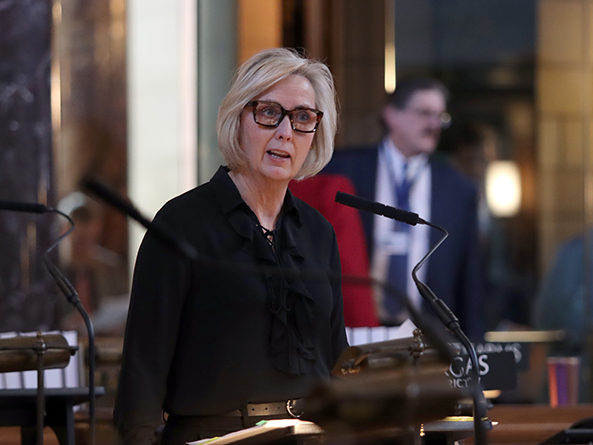Firefighter retirement bill clears first round
Lawmakers advanced a measure to select file April 4 that would makes changes to the retirement system for certain Nebraska firefighters on a promise from the bill’s sponsor that negotiations would continue.

Nebraska law classifies cities based on population. First class cities are those with a population between 5,001 and 100,000.
LB686, as introduced last session by Fremont Sen. Lynne Walz, would create a new cash balance retirement plan — which essentially is a pension plan — with a guaranteed annual return of at least 5% for firefighters in those cities. A Nebraska Retirement Systems Committee amendment instead would incorporate a number of other measures to change the existing defined contribution plan.
Among other provisions, the amendment would:
• change the definition of salary for firefighters in first class cities to include overtime, call-back and call-in pay and exclude clothing allowances and other benefits;
• increase contribution rates for employers and firefighters who do not pay into Social Security;
• allow firefighters not already required to do so to elect to pay into Social Security;
• allow two or more firefighter retirement committees to choose to pool assets into a single retirement fund; and
• require cities to provide two years of health insurance benefits upon retirement for eligible firefighters.
Walz said firefighters in first class cities were moved to a defined contribution plan in 1984 with the assurance that their new plan would match or exceed their defined benefit of 50% of their salary. That has not happened, she said, and the committee amendment is an attempt to help firefighters achieve the secure retirement they were promised.
Some firefighters are forced to rely on Medicare for basic health care after providing a lifetime of service to their communities, Walz said, while others continue to work while injured, or have left for jobs with other communities or states with better benefits and safety nets.
“After 40 years of inaction, this Legislature owes our firefighters a better deal than what this amendment offers — and certainly better than their current situation,” Walz said.
Seward Sen. Jana Hughes opposed the committee amendment, particularly the provision that would guarantee two years of health insurance benefits after retirement, which she called a “massive unfunded mandate” for first class cities.
“The only way cities can pay for these benefits is by increasing property taxes or making cuts to current programs and services,” Hughes said.
Sen. Mike Jacobson of North Platte echoed those concerns. He also opposed the committee proposal and offered an alternative amendment that would make a number of changes, including removing post-retirement health insurance benefits.
Senators initially approved Jacobson’s amendment on a 26-16 vote. Twenty-five votes were needed. After a successful motion to reconsider that vote, Omaha Sen. Mike McDonnell, chairperson of the committee, asked lawmakers to move the bill to select file so that negotiations could continue.
McDonnell acknowledged that an agreement might not be possible, given how little time is left in the legislative session, but said lawmakers owe it to the firefighters to try and fulfill a promise that the Legislature made 40 years ago.
“We’re on the shot clock,” he said. “At least give us a chance.”
Senators then voted down Jacobson’s amendment 24-17. After also rejecting the committee amendment on a 22-15 vote, lawmakers advanced LB686 to select file 25-14.


